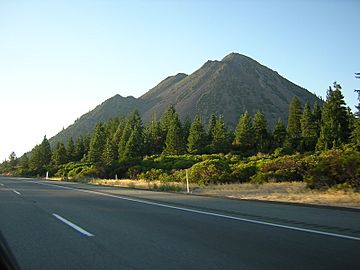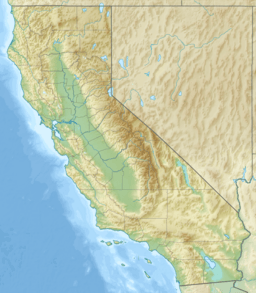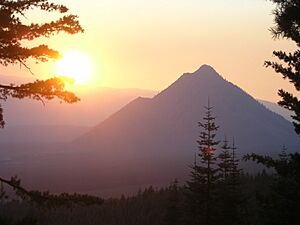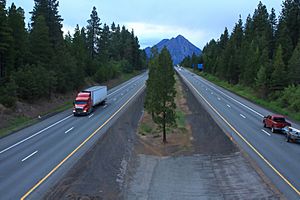Black Butte (Siskiyou County, California) facts for kids
Quick facts for kids Black Butte |
|
|---|---|

Black Butte, looking north from Interstate 5
|
|
| Highest point | |
| Elevation | 6,334 ft (1,931 m) NAVD 88 |
| Geography | |
| Parent range | Cascades |
| Topo map | USGS City of Mount Shasta |
| Geology | |
| Age of rock | Holocene |
| Mountain type | Lava dome |
| Volcanic arc | Cascade Volcanic Arc |
| Last eruption | About 9,500 years ago |
| Climbing | |
| Easiest route | Trail |
Black Butte is a special kind of mountain made from hardened lava. It's actually a group of lava domes that overlap each other. Imagine thick, sticky lava that slowly pushed out of the ground and piled up to form a dome shape. Black Butte is right next to Mount Shasta, almost like a smaller helper mountain.
This unique mountain is located in Siskiyou County, California, right next to Interstate 5. If you drive on I-5 between the towns of Mount Shasta and Weed, California, you'll see it. The freeway even goes over a pass called Black Butte Summit, which is at the mountain's base.
Black Butte formed a long time ago, about 9,000 to 10,000 years ago. This happened after a part of Mount Shasta, called Shastina, had its biggest eruptions. The lava that created Black Butte was a type called dacite, which is very thick and doesn't flow far, so it just piled up into domes.
Contents
Exploring Black Butte's Summit
The top of Black Butte has a cool history. In the early 1930s, the United States Forest Service built a fire lookout tower there. This tower was used to spot forest fires from high up. Sadly, a big storm in 1962 destroyed it.
But don't worry, a new lookout tower was built in 1963. It was used until 1973. Later, in 1975, the building was moved by a helicopter to a new spot! Today, only the concrete base of the old tower remains on the summit.
You can hike to the top of Black Butte! There's a trail that's about 2.5 miles (4 kilometers) long. It starts from a special spot you can reach by gravel roads.
Amazing Views from the Top
When you reach the summit, you get incredible views! You can see the southwest side of Mount Shasta and Shastina very clearly. On a sunny day, you might even see Mount McLoughlin in Oregon, which is about 70 miles (113 km) away to the north. Looking south, you can spot Lassen Peak, about 80 miles (129 km) away. It's a great place to see other volcanoes!
Black Butte's Train History
Black Butte has an interesting connection to trains. From 1887 to 1911, there was a train station called Black Butte Summit. It was part of the Southern Pacific (SP) Siskiyou Line.
In the 1920s, the Southern Pacific built a new, less steep train route. A small rail yard, a special track shape called a wye, and an office for train orders were built at the current Black Butte site. This new station opened on September 1, 1926.
In the early 1940s, the station moved, and the train yard got bigger. The station even had a water tank for the trains and homes for the railroad workers. Some workers and their families lived there until the early 1970s. The water tank is still there today!
The train orders office was used until 1966. After that, a new system called Centralized Traffic Control took over. Sadly, the train orders office was destroyed in a train accident in 1970.
In 1992, the Southern Pacific stopped using the Siskiyou Line in this area. Later, in 1996, Union Pacific took over Southern Pacific.
Train Accidents and Routes
A famous passenger train called the Coast Starlight had a small accident at Black Butte on December 7, 2000. Luckily, only one engineer was hurt.
Sometimes, the Coast Starlight train crews will change at Black Butte instead of their usual stop in Klamath Falls.
Railroad Lines Near Black Butte
Black Butte is an important spot for trains. The Black Butte Subdivision of the Union Pacific Railroad starts in Klamath Falls, Oregon and ends in Dunsmuir, California.
There's also a place called Springfield Junction in Oregon where two major train lines split. They don't join up again until they reach Black Butte.
Today, Black Butte is also home to the Black Butte Center for Railroad Culture, which celebrates train history.
 | Roy Wilkins |
 | John Lewis |
 | Linda Carol Brown |




